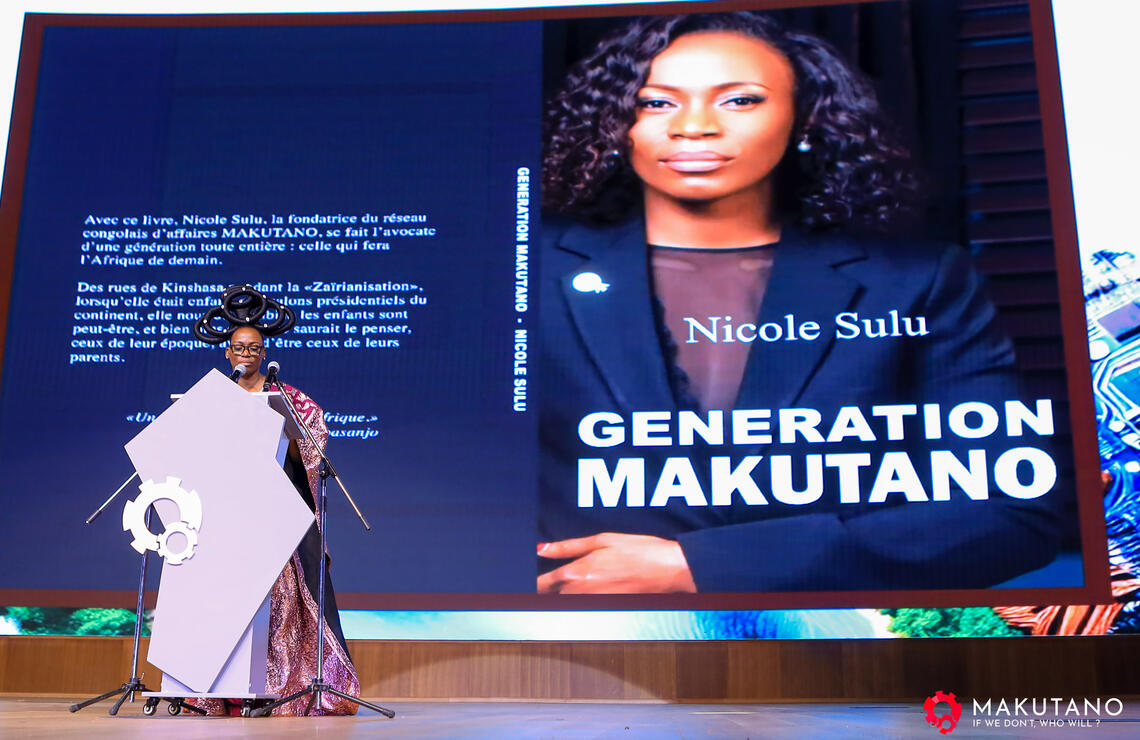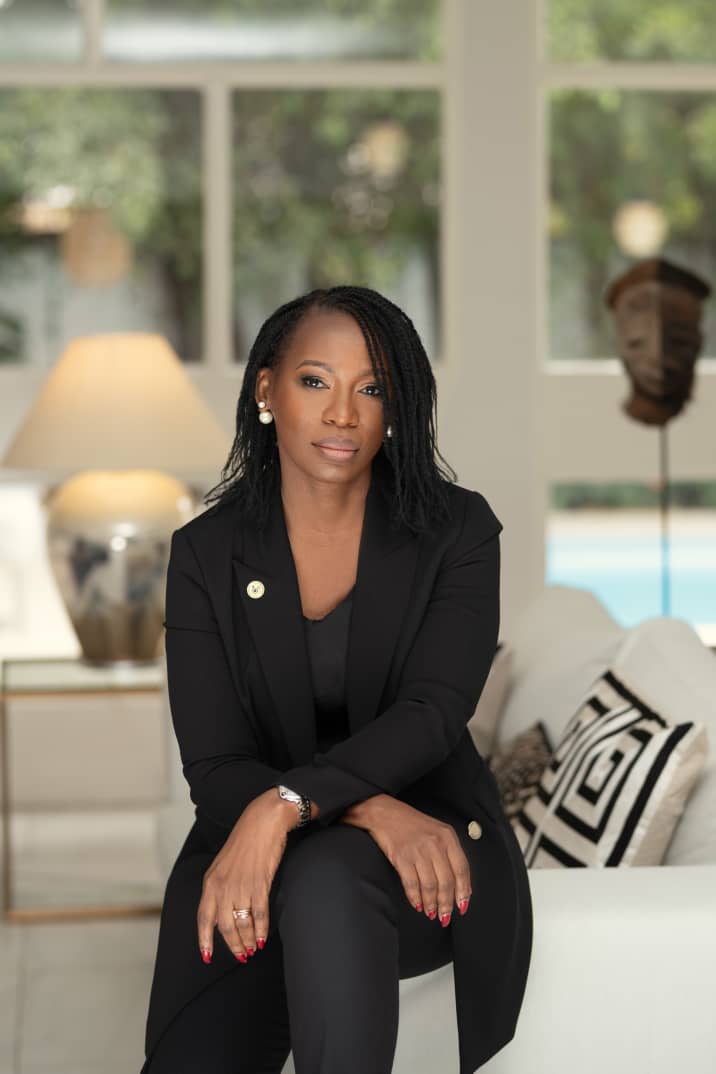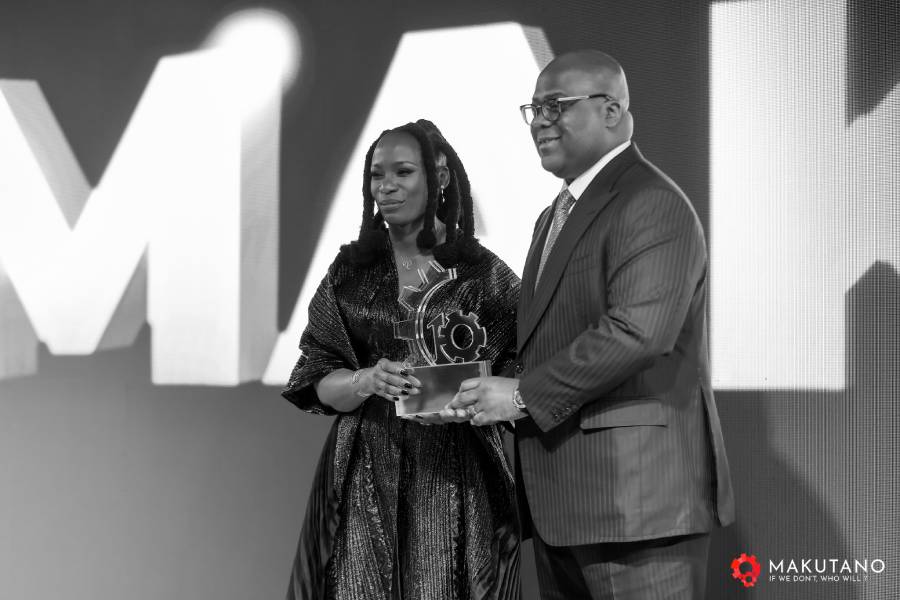
Nicole Sulu
“Africa has everything it needs to succeed, as long as it creates bridges between its talent, resources and investors”
Nicole Sulu is the founder of the Makutano International Business Forum which, in mid-November, held its tenth edition in Kinshasa.
AM: Makutano celebrated its tenth edition in Kinshasa from 13 to 15 November. How would you define the nature and objectives of this forum?

Nicole Sulu: Makutano is first and foremost a business network designed to connect Africans. Created in response to observing regional economic bottlenecks, it has given rise to a unique platform, the forum. When it was launched in 2014 in Kinshasa, the aim was clear: to provide a space where entrepreneurs, and public and private decision-makers can meet, talk and act together to unlock the region's economic potential.
Ten years on, it has become a true catalyst for opportunities: a deal facilitator that accelerates ambitious projects. There are strategic discussions, as well as concrete partnerships. For example, thanks to Makutano, projects in agriculture, infrastructure and energy have come to fruition, with real impacts on communities.
Over and above the business aspect, Makutano also represents the conviction that Africa has everything it needs to succeed as long as it builds bridges between its talents, resources and investors. And I believe that an increasing number of us believe this. The proof is in the numbers: ten years ago, there were twenty of us at the network's launch, and for this tenth edition, we have brought together over 1,000 African and international decision-makers. This is the facilitating role that the forum plays today - not just in the DRC, but throughout Africa.
Ten years is a long time. What principles does the forum rely on to establish itself and ‘last’?
The Makutano Forum is not just a meeting place, it's designed to transform this interaction into concrete opportunities. Before each event, we identify priorities and bottlenecks so that we can propose appropriate solutions.
Our longevity is also based on the quality of our speakers and our role as a unifying force. Makutano brings together the right people: the public authorities, who create a favourable framework, and the private operators, who create wealth. This strategic dialogue enables us to build fruitful partnerships that contribute to the continent's sustainable economic development.
Besides, Makutano is much more than an annual event: it's an active ecosystem, where members collaborate throughout the year to take their ideas forward. With the involvement of political figures and investors, we guarantee a favourable environment for projects to flourish.
And then there's our network. Makutano has more than 600 active members in Africa and around the world, who work together throughout the year on solutions tailored to local realities. We nurture this network. Makutano is not just a forum: it's a mark of trust, a label for investors and an engine of change for Africa. And that's what makes us indispensable in today's ecosystem.
The forum serves as a spectacular meeting point. How does one ensure that this ‘town square’ acts as a real business incubator for companies, with tangible results?

What makes Makutano so strong and unique is that it is a facilitator of deals. The forum is not all talk or theoretical discussions: it creates a pragmatic framework conducive to tangible results, where discussions lead to strategic partnerships and concrete projects.
Each edition generates real commitments. At the last event, for example, the Minister for Hydrocarbons, H.E. Aimé Molendo Sakombi, announced a new call for tenders in the oil sector scheduled for the first quarter of 2025, accompanied by an attractive and secure tax regime to attract investors.
Following Makutano 9, which was held in Abidjan, we also noted an increase in trade of more than 7 billion CFA francs between Côte d'Ivoire and the DRC.
But that's not all. Over the past four years, more than 350 contracts have been signed between members of the Makutano network. For example, on financing issues, we were behind two agreements between Proparco and Congolese banks Equity BCDC and Advans Banque Congo, worth a total of 15 million US dollars. These agreements are already translating into concrete projects.
These tangible results are a perfect illustration of Makutano's role as a deal facilitator: a space to which participants return every year, confident that they will cement partnerships and sign significant agreements.
Some describe Makutano as a major instrument of soft power for the DRC. Do you feel you have a mission in this area, to project a more attractive and positive image of the country?
Yes, absolutely. Makutano is an major strategic lever for changing the image of the DRC. The country is too often seen through the lens of its challenges, whereas it has immense potential to offer: natural resources, talent, ideas and economic opportunities. And Makutano is here to prove it: you can do business in the DRC, but you can also produce, innovate and create. With this in mind, at the Forum's tenth edition, we wanted to pay particular attention to other levers of our economy that are real instruments of soft power, such as the House of Cultural and Creative Industries. Culture is a major lever of influence and we have explored concrete avenues, such as the production of local series and films. These initiatives are not just tools for cultural influence, but also economic and diplomatic opportunities that project a positive and modern image of our country.
By putting forward a new narrative about the DRC - a country that is overcoming its challenges to become a driving force for African transformation - Makutano is establishing itself as a legitimate instrument of soft power. We want to show an innovative, resilient DRC that is ready to inspire the world, while building strong international partnerships.
Makutano as a network travels, but Kinshasa is home to the forum. You say ‘the DRC must be the beating heart of Africa's emergence’. What is your vision of the country's development? How can this tremendous potential be realised on a day-to-day basis?
For me, the DRC's development is based on two pillars: the ongoing creation of a favourable business environment to attract investors, and strengthening links with the other countries of Africa to build the strong and prosperous continent that we all want to see. These efforts must be stepped up, and this is precisely where Makutano, as a catalyst for synergies and collaboration, plays a strategic role.
For the DRC to realise its immense potential, we need to act on some very concrete drivers. Firstly, there is an urgent need to improve the business climate: simplify administrative procedures, guarantee legal stability and offer tax incentives to investors. Secondly, we need to diversify our economy - for example, by developing agriculture, the technology sector and tourism, so that we are not solely dependent on mining.
Makutano plays a key role in this transformation. To create solid partnerships, the forum facilitates concrete meetings between investors, entrepreneurs and decision-makers. It also fosters the introduction of reforms to attract financing.
However, Makutano is not exclusive to Kinshasa: our ambition to be the beating heart of Africa's emergence extends far beyond. For example, Makutano 9 was held in Abidjan, and we have also held meetings in Brazzaville. This reflects our strategy of building bridges with other African countries, because a strong Africa cannot be built in isolation. With its 54 states, the continent must focus on cooperation and synergies.
We also travelled within the DRC. Holding forums in the regions helps to connect local players with national and international opportunities. This willingness to decentralise strengthens the impact of the forum on the ground and shows that the DRC can be both a hub and a regional driving force.
You mentioned a 2050 horizon for a new Africa. On which key sectors should collective efforts be focused?
For 2050, it is essential that Africa focuses on strategic sectors capable of transforming the continent and realising its immense potential. Energy and mining, with key resources such as cobalt and lithium, must be exploited, not only to meet growing global demand, but above all to create added value locally. We need to build local industries that can process these resources, to produce things like batteries and other technological components, and thereby establish industrial sovereignty.
The production of and access to electricity are crucial, not only for economic and industrial development, but also for improving household comfort. The Inga initiative, showcased at Makutano 10, embodies this ambition, with enormous potential to support the DRC and its neighbours.
Infrastructure is another essential factor. Imagine a continent where transport and digital connectivity are integrated, allowing goods, ideas and people to move freely. At Makutano 10, we imagined a train linking Kinshasa to Lagos or a metro between Brazzaville and Kinshasa. These aren't utopian projects, they are essential tools for a fully functional continental market.
Agriculture's role cannot be underestimated. Africa becoming the breadbasket of the world is not just a dream, it is an attainable reality if we invest in innovative agricultural technologies and develop local value chains so that our agricultural products benefit Africans first and foremost.
This vision is anchored in public and private sector collaboration, and is the pillar of the African New Deal that we have been promoting. It is a call to all Africans: together, we can make our continent a respected and prosperous power by 2050.
And lastly, speaking of the future, one of the areas in which Makutano is keen to invest is the development of appropriate training programmes to prepare the continent's future top managers and CEOs. Training the leaders of tomorrow is not just an ambition, it's a necessity to ensure that Africa can meet the challenges of the future and fully seize its destiny.